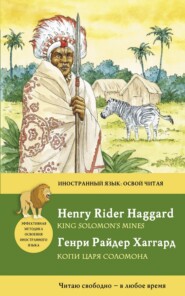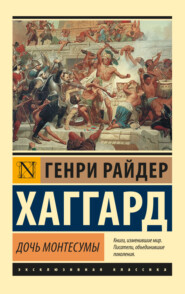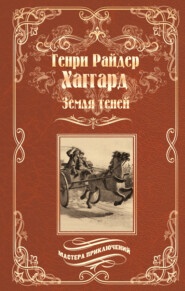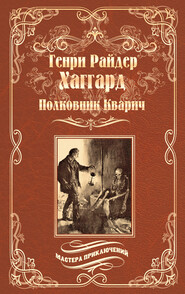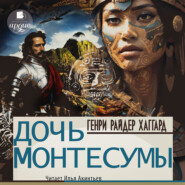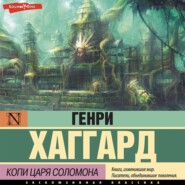По всем вопросам обращайтесь на: info@litportal.ru
(©) 2003-2024.
✖
The World's Desire
Настройки чтения
Размер шрифта
Высота строк
Поля
“Then it well may chance that thou shalt find it, for ever those who seek love lose, and those who seek not find.”
“I am come to seek another love,” said the Wanderer, “and I seek her till I die.”
“Then I pray the Gods that thou mayest find her, and that Khem may thus be saved from sorrow. But here in Egypt there is no woman so fair as Meriamun, and thou must seek farther as quickly as may be. And now, Eperitus, behold I must away to do service in the Temple of the Holy Amen, for I am his High Priest. But I am commanded by Pharaoh first to bring thee to the feast at the Palace.”
Then he led the Wanderer from his chamber and brought him by a side entrance to the great Palace of the Pharaoh at Tanis, near the Temple of Ptah. And first he took him to a chamber that had been made ready for him in the Palace, a beautiful chamber, richly painted with beast-headed Gods and furnished with ivory chairs, and couches of ebony and silver, and with a gilded bed.
Then the Wanderer went into the shining baths, and dark-eyed girls bathed him and anointed him with fragrant oil, and crowned him with lotus flowers. When they had bathed him they bade him lay aside his golden armour and his bow and the quiver full of arrows, but this the Wanderer would not do, for as he laid the black bow down it thrilled with a thin sound of war. So Rei led him, armed as he was, to a certain antechamber, and there he left him, saying that he would return again when the feast was done. Trumpets blared as the Wanderer waited, drums rolled, and through the wide thrown curtains swept the lovely Meriamun and the divine Pharaoh Meneptah, with many lords and ladies of the Court, all crowned with roses and with lotus blooms.
The Queen was decked in Royal attire, her shining limbs were veiled in broidered silk; about her shoulders was a purple robe, and round her neck and arms were rings of well-wrought gold. She was stately and splendid to see, with pale brows and beautiful disdainful eyes where dreams seemed to sleep beneath the shadow of her eyelashes. On she swept in all her state and pride of beauty, and behind her came the Pharaoh. He was a tall man, but ill-made and heavy-browed, and to the Wanderer it seemed that he was heavy-hearted too, and that care and terror of evil to come were always in his mind.
Meriamun looked up swiftly.
“Greeting, Stranger,” she said. “Thou comest in warlike guise to grace our feast.”
“Methought, Royal Lady,” he made answer, “that anon when I would have laid it by, this bow of mine sang to me of present war. Therefore I am come armed – even to thy feast.”
“Has thy bow such foresight, Eperitus?” said the Queen. “I have heard but once of such a weapon, and that in a minstrel’s tale. He came to our Court with his lyre from the Northern Sea, and he sang of the Bow of Odysseus.”
“Minstrel or not, thou does well to come armed, Wanderer,” said the Pharaoh; “for if thy bow sings, my own heart mutters much to me of war to be.”
“Follow me, Wanderer, however it fall out,” said the Queen.
So he followed her and the Pharaoh till they came to a splendid hall, carven round with images of fighting and feasting. Here, on the painted walls, Rameses Miamun drove the thousands of the Khita before his single valour; here men hunted wild-fowl through the marshes with a great cat for their hound. Never had the Wanderer beheld such a hall since he supped with the Sea King of the fairy isle. On the daïs, raised above the rest, sat the Pharaoh, and by him sat Meriamun the Queen, and by the Queen sat the Wanderer in the golden armour of Paris, and he leaned the black bow against his ivory chair.
Now the feast went on and men ate and drank. The Queen spoke little, but she watched the Wanderer beneath the lids of her deep-fringed eyes.
Suddenly, as they feasted and grew merry, the doors at the end of the chamber were thrown wide, the Guards fell back in fear, and behold, at the end of the hall, stood two men. Their faces were tawny, dry, wasted with desert wandering; their noses were hooked like eagles’ beaks, and their eyes were yellow as the eyes of lions. They were clad in rough skins of beasts, girdled about their waists with leathern thongs, and fiercely they lifted their naked arms, and waved their wands of cedar. Both men were old, one was white-bearded, the other was shaven smooth like the priests of Egypt. As they lifted the rods on high the Guards shrank like beaten hounds, and all the guests hid their faces, save Meriamun and the Wanderer alone. Even Pharaoh dared not look on them, but he murmured angrily in his beard:
“By the name of Osiris,” he said, “here be those Soothsayers of the Apura once again. Now Death waits on those who let them pass the doors.”
Then one of the two men, he who was shaven like a priest, cried with a great voice:
“Pharaoh! Pharaoh! Pharaoh! Hearken to the word of Jahveh. Wilt thou let the people go?”
“I will not let them go,” he answered.
“Pharaoh! Pharaoh! Pharaoh! Hearken to the word of Jahveh. If thou wilt not let the people go, then shall all the firstborn of Khem, of the Prince and the slave, of the ox and the ass, be smitten of Jahveh. Wilt thou let the people go?”
Now Pharaoh hearkened, and those who were at the feast rose and cried with a loud voice:
“O Pharaoh, let the people go! Great woes are fallen upon Khem because of the Apura. O Pharaoh, let the people go!”
Now Pharaoh’s heart was softened and he was minded to let them go, but Meriamun turned to him and said:
“Thou shalt not let the people go. It is not these slaves, nor the God of these slaves, who bring the plagues on Khem, but it is that strange Goddess, the False Hathor, who dwells here in the city of Tanis. Be not so fearful – ever hadst thou a coward heart. Drive the False Hathor thence if thou wilt, but hold these slaves to their bondage. I still have cities that must be built, and yon slaves shall build them.”
Then the Pharaoh cried: “Hence! I bid you. Hence, and to-morrow shall your people be laden with a double burden and their backs shall be red with stripes. I will not let the people go!”
Then the two men cried aloud, and pointing upward with their staffs they vanished from the hall, and none dared to lay hands on them, but those who sat at the feast murmured much.
Now the Wanderer marvelled why Pharaoh did not command the Guards to cut down these unbidden guests, who spoiled his festival. The Queen Meriamun saw the wonder in his eyes and turned to him.
“Know thou, Eperitus,” she said, “that great plagues have come of late on this land of ours – plagues of lice and frogs and flies and darkness, and the changing of pure waters to blood. And these things our Lord the Pharaoh deems have been brought upon us by the curse of yonder magicians, conjurers and priests among certain slaves who work in the land at the building of our cities. But I know well that the curses come on us from Hathor, the Lady of Love, because of that woman who hath set herself up here in Tanis, and is worshipped as the Hathor.”
“Why then, O Queen,” said the Wanderer, “is this false Goddess suffered to abide in your fair city? for, as I know well, the immortal Gods are ever angered with those who turn from their worship to bow before strange altars.”
“Why is she suffered? Nay, ask of Pharaoh my Lord. Methinks it is because her beauty is more than the beauty of women, so the men say who have looked on it, but I have not seen it, for only those men see it who go to worship at her shrine, and then from afar. It is not meet that the Queen of all the Lands should worship at the shrine of a strange woman, come – like thyself, Eperitus – from none knows where: if indeed she be a woman and not a fiend from the Under World. But if thou wouldest learn more, ask my Lord the Pharaoh, for he knows the Shrine of the False Hathor, and he knows who guard it, and what is it that bars the way.”
Now the Wanderer turned to Pharaoh saying: “O Pharaoh, may I know the truth of this mystery?”
Then Meneptah looked up, and there was doubt and trouble on his heavy face.
“I will tell thee readily, thou Wanderer, for perchance such a man as thou, who hast travelled in many lands and seen the faces of many Gods, may understand the tale, and may help me. In the days of my father, the holy Rameses Miamun, the keepers of the Temple of the Divine Hathor awoke, and lo! in the Sanctuary of the temple was a woman in the garb of the Aquaiusha, who was Beauty’s self. But when they looked upon her, none could tell the semblance of her beauty, for to one she seemed dark and to the other fair, and to each man of them she showed a diverse loveliness. She smiled upon them, and sang most sweetly, and love entered their hearts, so that it seemed to each man that she only was his Heart’s Desire. But when any man would have come nearer and embraced her, there was that about her which drove him back, and if he strove again, behold, he fell down dead. So at last they subdued their hearts, and desired her no more, but worshipped her as the Hathor come to earth, and made offerings of food and drink to her, and prayers. So three years passed, and at the end of the third year the keepers of the temple looked and the Hathor was gone. Nothing remained of her but a memory. Yet there were some who said that this memory was dearer than all else that the world has to give.
“Twenty more seasons went by, and I sat upon the throne of my father, and was Lord of the Double Crown. And, on a day, a messenger came running and cried:
“‘Now is Hathor come back to Khem, now is Hathor come back to Khem, and, as of old, none may draw near her beauty!’ Then I went to see, and lo! before the Temple of Hathor a great multitude was gathered, and there on the pylon brow stood the Hathor’s self shining with changeful beauty like the Dawn. And as of old she sang sweet songs, and, to each man who heard, her voice was the voice of his own beloved, living and lost to him, or dead and lost. Now every man has such a grave in his heart as that whence Hathor seems to rise in changeful beauty. Month by month she sings thus, one day in every month, and many a man has sought to win her and her favour, but in the doorways are they who meet him and press him back; and if he still struggles on, there comes a clang of swords and he falls dead, but no wound is found on him. And, Wanderer, this is truth, for I myself have striven and have been pressed back by that which guards her. But I alone of men who have looked on her and heard her, strove not a second time, and so saved myself alive.”
“Thou alone of men lovest life more than the World’s Desire!” said the Queen. “Thou hast ever sickened for the love of this strange Witch, but thy life thou lovest even better than her beauty, and thou dost not dare attempt again the adventure of her embrace. Know, Eperitus, that this sorrow is come upon the land, that all men love yonder witch and rave of her, and to each she wears a different face and sings in another voice. When she stands upon the pylon tower, then thou wilt see the madness with which she has smitten them. For they will weep and pray and tear their hair. Then they will rush through the temple courts and up to the temple doors, and be thrust back again by that which guards her. But some will yet strive madly on, and thou wilt hear the clash of arms and they will fall dead before thee. Accursed is the land, I tell thee, Wanderer; because of that Phantom it is accursed. For it is she who brings these woes on Khem; from her, not from our slaves and their mad conjurers, come plagues, I say, and all evil things. And till a man be found who may pass her guard, and come face to face with the witch and slay her, plagues and woes and evil things shall be the daily bread of Khem. Perchance, Wanderer, thou art such a man,” and she looked on him strangely. “Yet if so, this is my counsel, that thou go not up against her, lest thou also be bewitched, and a great man be lost to us.”
Now the Wanderer turned the matter over in his heart and made answer:
“Perchance, Lady, my strength and the favour of the Gods might serve me in such a quest. But methinks that this woman is meeter for words of love and the kisses of men than to be slain with the sharp sword, if, indeed, she be not of the number of the immortals.”
Now Meriamun flushed and frowned.
“It is not fitting so to talk before me,” she said. “Of this be sure, that if the Witch may be come at, she shall be slain and given to Osiris for a bride.”
Now the Wanderer saw that the Lady Meriamun was jealous of the beauty and renown and love of her who dwelt in the temple, and was called the Strange Hathor, and he held his peace, for he knew when to be silent.
II THE NIGHT OF DREAD
The feast dragged slowly on, for Fear was of the company. The men and women were silent, and when they drank, it was as if one had poured a little oil on a dying fire. Life flamed up in them for a moment, their laughter came like the crackling of thorns, and then they were silent again. Meanwhile the Wanderer drank little, waiting to see what should come. But the Queen was watching him whom already her heart desired, and she only of all the company had pleasure in this banquet. Suddenly a side-door opened behind the daïs, there was a stir in the hall, each guest turning his head fearfully, for all expected some evil tidings. But it was only the entrance of those who bear about in the feasts of Egypt an effigy of the Dead, the likeness of a mummy carved in wood, and who cry: “Drink, O King, and be glad, thou shalt soon be even as he! Drink, and be glad.” The stiff, swathed figure, with its folded hands and gilded face, was brought before the Pharaoh, and Meneptah, who had sat long in sullen brooding silence, started when he looked on it. Then he broke into an angry laugh.
“We have little need of thee to-night,” he cried, as he saluted the symbol of Osiris. “Death is near enough, we want not thy silent preaching. Death, Death is near!”
He fell back in his gilded chair, and let the cup drop from his hand, gnawing at his beard.
“Art thou a man?” spoke Meriamun, in a low clear voice; “are you men, and yet afraid of what comes to all? Is it only to-night that we first hear the name of Death? Remember the great Men-kau-ra, remember the old Pharaoh who built the Pyramid of Hir. He was just and kind, and he feared the Gods, and for his reward they showed him Death, coming on him in six short years. Did he scowl and tremble, like all of you to-night, who are scared by the threats of slaves? Nay, he outwitted the Gods, he made night into day, he lived out twice his years, with revel and love and wine in the lamp-lit groves of persea trees. Come, my guests, let us be merry, if it be but for an hour. Drink, and be brave!”
“For once thou speakest well,” said the King. “Drink and forget; the Gods who give Death give wine,” and his angry eyes ranged through the hall, to seek some occasion of mirth and scorn.
“Thou Wanderer!” he said, suddenly. “Thou drinkest not: I have watched thee as the cups go round; what, man, thou comest from the North, the sun of thy pale land has not heat enough to foster the vine. Thou seemest cold, and a drinker of water; why wilt thou be cold before thine hour? Come, pledge me in the red wine of Khem. Bring forth the cup of Pasht!” he cried to them who waited, “bring forth the cup of Pasht, the King drinks!”
Then the chief butler of Pharaoh went to the treasure-house, and came again, bearing a huge golden cup, fashioned in the form of a lion’s head, and holding twelve measures of wine. It was an ancient cup, sacred to Pasht, and a gift of the Rutennu to Thothmes, the greatest of that name.
“Fill it full of unmixed wine!” cried the King. “Dost thou grow pale at the sight of the cup, thou Wanderer from the North? I pledge thee, pledge thou me!”






